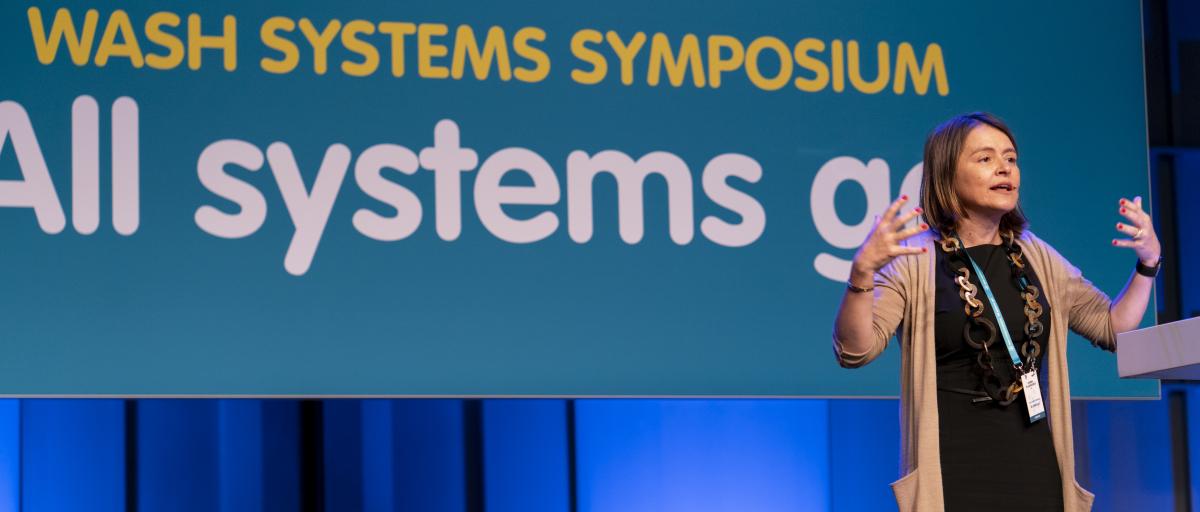What it will take to bring water and sanitation to everyone.
Published on: 17/04/2019

Catarina de Albuquerque speaking at the closing ceremony of All systems go! © Robert Tjalondo
The water and sanitation sector has achieved a remarkable degree of consensus about what is needed (strong systems) to deliver the Sustainable Development Goals. The next step is to get the political will to build those systems.
It is easy to make talking about water and sanitation systems both dry and technocratic: regulation, service authorities, benchmarks, are not words to set (normal people’s) hearts beating. So for me Catarina de Albuquerque’s passionate advocacy for access to clean water and safe sanitation as the most fundamental of human rights was a timely reminder of the fundamental goal behind last month’s All systems go! symposium. As the former UN special rapporteur on the right to safe drinking water and sanitation, and current chief executive of the Sanitation and Water for All partnership, Catarina was exactly the right person to make this critical point.
For me, as someone whose heart can – at least sometimes – be made to beat faster by considering regulatory frameworks for water, the real success of All systems go! was in the alignment of Catarina’s passion with the deep content of so many other sessions. Delivering Sustainable Development Goal (SDG) 6 requires both.
Indeed, a personal objective in hosting All systems go! was to bring some of the passion and urgency that naturally attracts itself to the goal of delivering water and sanitation, to the less immediately compelling subject of how we do this. To take the emerging consensus on WASH systems and link it to the political project of universal access contained in the SDGs. That I believe we succeeded, is thanks to the 350 or so dedicated practitioners who came together to share their skills, experiences and passion.
These practitioners came from across the WASH system: government both local and national; donors; service deliverers – public, private and NGO; and, research and learning organisations. A systems based understanding of WASH tells us that all of these different systems actors are required to deliver services, and that driving change in the water and sanitation system requires collective action by all of them.

Hon. Cecilia Abena Dapaah, Ghana's Minister for Sanitation and Water Resources, speaking at IRC's All systems go! © Robert Tjalondo
Passion and knowledge are critical. So too is political leadership, particularly to inform and drive collective action. Our guest of honour, Cecilia Abena Dapaah spoke compellingly about the potential that comes with strong political will; how, as Minister for Sanitation and Water Resources, she is a cabinet minister expected to report directly to the President on his ambition to deliver services to all and to make Accra the cleanest city in Africa.
I left All systems go! more convinced than ever that it is this combination of passion, leadership and knowledge that is required to achieve SDG 6. Most importantly, that the dedication of those working in the water and sanitation sector needs to be matched and supported by political leadership from the highest level.
Over the last decade or so we have achieved the beginnings of a remarkable transformation in the water and sanitation sector, particularly in rural and informal urban areas. We have moved from a focus on delivering hardware managed by ad-hoc and poorly defined community structures to an understanding that truly sustainable services are delivered by professionals operating within clear legal and regulatory frameworks: in a word, by strong systems. We are also beginning to see that once strong systems are in place, they are capable of attracting finance and sustaining themselves over time. Much of the knowledge, in other words, exists.
It follows that the next challenge is to apply that knowledge to building strong national and local systems for water and sanitation services, something that in turn requires wholesale reform and investment. Both of which ask for the sort of high level government leadership demonstrated in the past in much of South-East Asia, and currently in India or, as we heard at the symposium, Ghana.
Taking part in the Sanitation and Water for All (SWA) partnership’s Sector Ministers' Meeting in Costa Rica, two weeks after All systems go!, I became more convinced of this point than ever. The way we are going to deliver the water and sanitation SDGs will be through sector reform: building strong WASH systems that are more professional, better regulated, and with better tariff systems. The 50 or so ministers for water and sanitation assembled in Costa Rica are, largely, well aware of this. Where they need help, is in getting the initial focus (and financing) for the required transformation from higher political levels: presidents, prime ministers and ministers of finance.
Achieving sector transformation demands two things. That we keep talking to ourselves as a WASH community, as we did in All systems go!, to refine our knowledge of what needs to be done; and, that we also start to speak effectively and with passion (and evidence) outside of the WASH community. We must learn to tell a compelling story to national leadership about why building strong and resilient water and sanitation systems is a good investment - we know that it is! We must also insist that they take ownership of, and show leadership in, driving the sector reform and systems strengthening.
As a community, we are increasingly clear that water and sanitation can be sustainable, can deliver services to everyone, can ensure no one is left behind, and can attract the financing to do so. However, it can do so only with hard work and investment in making the sector and its systems professional, accountable and investible. The way forward then lies in combining passion, political leadership and knowledge.
At IRC we have strong opinions and we value honest and frank discussion, so you won't be surprised to hear that not all the opinions on this site represent our official policy.